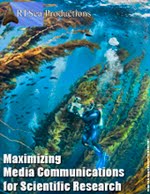 NOAA, the U.S. National Oceanographic and Atmospheric Administration, took a slightly unusual step by declaring the eastern North Pacific's basking shark a "species of concern." While it sounds a bit like a suspect in an unsolved homicide, what the designation actually does is recognize that the basking sharks that migrate along the coast from Canada to the central coast of California are not recovering in numbers as expected since the taking of basking sharks commercially was curtailed in the 1970s.
NOAA, the U.S. National Oceanographic and Atmospheric Administration, took a slightly unusual step by declaring the eastern North Pacific's basking shark a "species of concern." While it sounds a bit like a suspect in an unsolved homicide, what the designation actually does is recognize that the basking sharks that migrate along the coast from Canada to the central coast of California are not recovering in numbers as expected since the taking of basking sharks commercially was curtailed in the 1970s.Basking sharks, which are listed as endangered on the IUCN Red List but not yet eligible for protection under the U.S.'s Endangered Species Act, are typically cold water, plankton-feeders
 and quite spectacular to see. Reaching lengths of up to 40 feet, they cruise near the surface with their cavernous mouth agape, filtering plankton and other small organisms. They pose no threat to humans but the reverse is certainly not the case.
and quite spectacular to see. Reaching lengths of up to 40 feet, they cruise near the surface with their cavernous mouth agape, filtering plankton and other small organisms. They pose no threat to humans but the reverse is certainly not the case.Basking sharks have been hunted in the past - sometimes for meat, sometimes because they disrupt the salmon fisheries. Though now protected from deliberately being taken, they can still get caught in fishing nets or struck by vessels as they cruise the surface.
The importance of a government scientific agency taking a step like this is that it essentially greases the wheels for marine scientists to consider the basking shark as a study subject. With NOAA's acknowledged concern, the designation can assist scientists in seeking funding for research projects.
"But why should we fund your study of this shark? It's not exactly endangered is it?" "No, not yet. But NOAA feels sufficiently concerned enough to give it this designation as a warning that steps need to be taken to avoid endangering the animal further. And to know just what those steps should be, we need research. Funded research."
The basking shark - a shark that once schooled by the hundreds in decades past, now only seen a few at a time. If at all. NOAA is taking the commendable step of raising a flag. And they plan to do more. A website will be launched in December for scientists and the public alike to report sightings. In the meantime, you can report sightings by calling 858-334-2884 or send an email to Heidi.Dewar@noaa.gov.
Read more about NOAA's announcement in ScienceNews.
Read more about basking sharks at NOAA's website.

















No comments:
Post a Comment